Abstract
The in vitro activity of combinations of penicillin and netilimicin was determined against 20 clinical isolates of enterococci and compared with that obtained in simultaneous tests with penicillin/sisomicin, penicillin/streptomycin, and penicillin/kanamycin. Synergy between the two drugs in each combination was determined by the use of quantitative kill curves and was defined as a killing by the combination at least 100-fold greater than that produced by the most effective drug alone. Penicillin/netilmicin and penicillin/sisomicin combinations were found to be synergistic against the majority of isolates tested, including strains resistant to penicillin/streptomycin or penicillin/kanamycin combinations. This synergy with penicillin could be demonstrated at a concentration of ≤7 μg/ml for either netilmicin or sisomicin. Studies on the kinetics of killing produced by these combinations showed the rate and extent of killing to be directly dependent upon the organism's relative susceptibility to the aminoglycoside alone and the aminoglycoside concentration in the combination. Results also indicated that the interaction between penicillin and netilmicin was true synergy; i.e., rapid and complete killing was produced by combinations containing each drug at concentrations insufficient to produce any killing alone, and the killing observed could not be produced by either drug alone at a concentration equivalent to the total drug concentration in the combination. The potential clinical application of this synergistic interaction should be investigated further, especially in view of recent reports showing netilmicin to be considerably less toxic than gentamicin in experimental animals.
Full text
PDF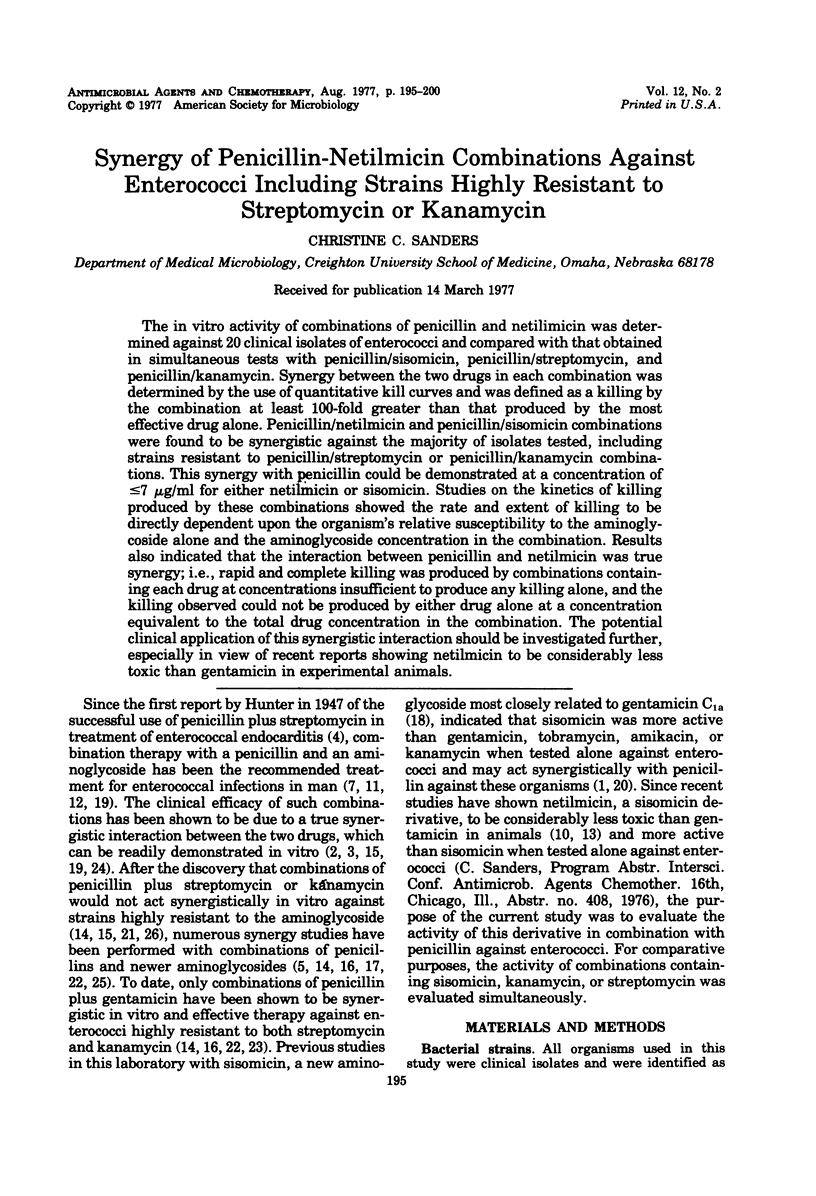
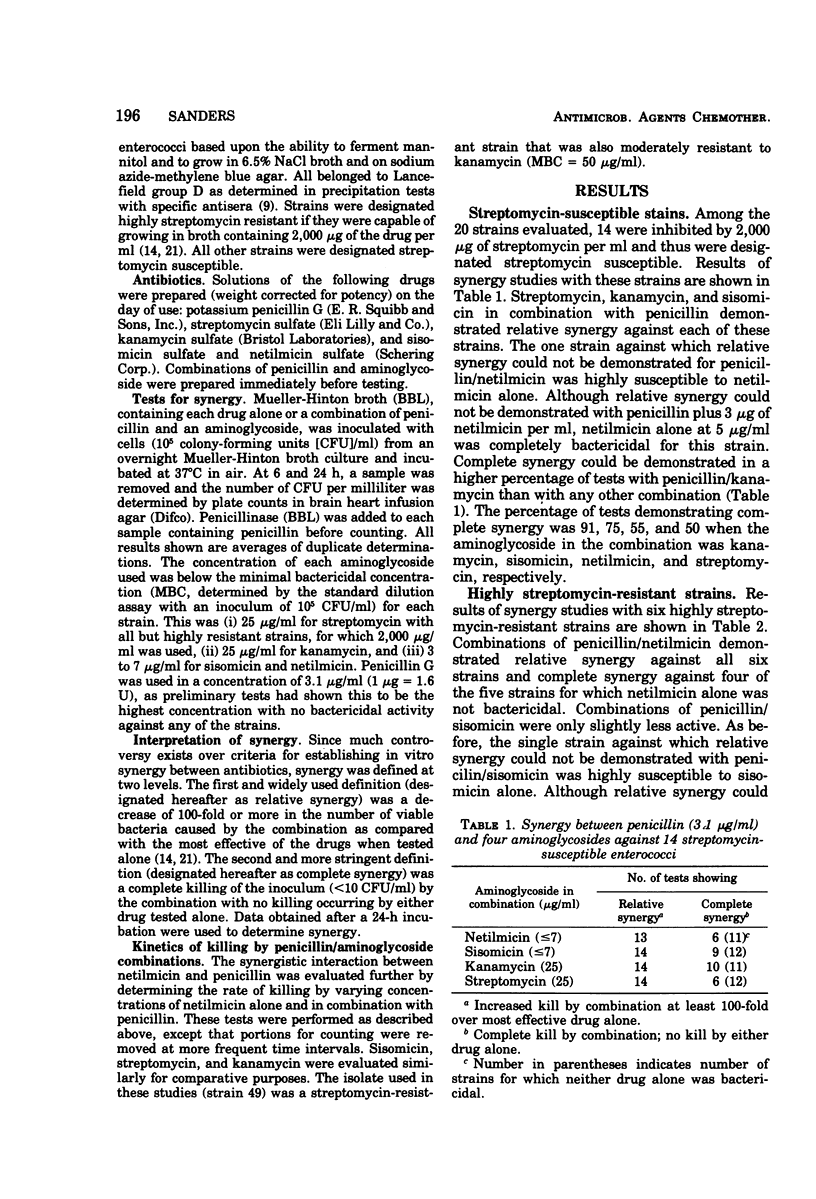
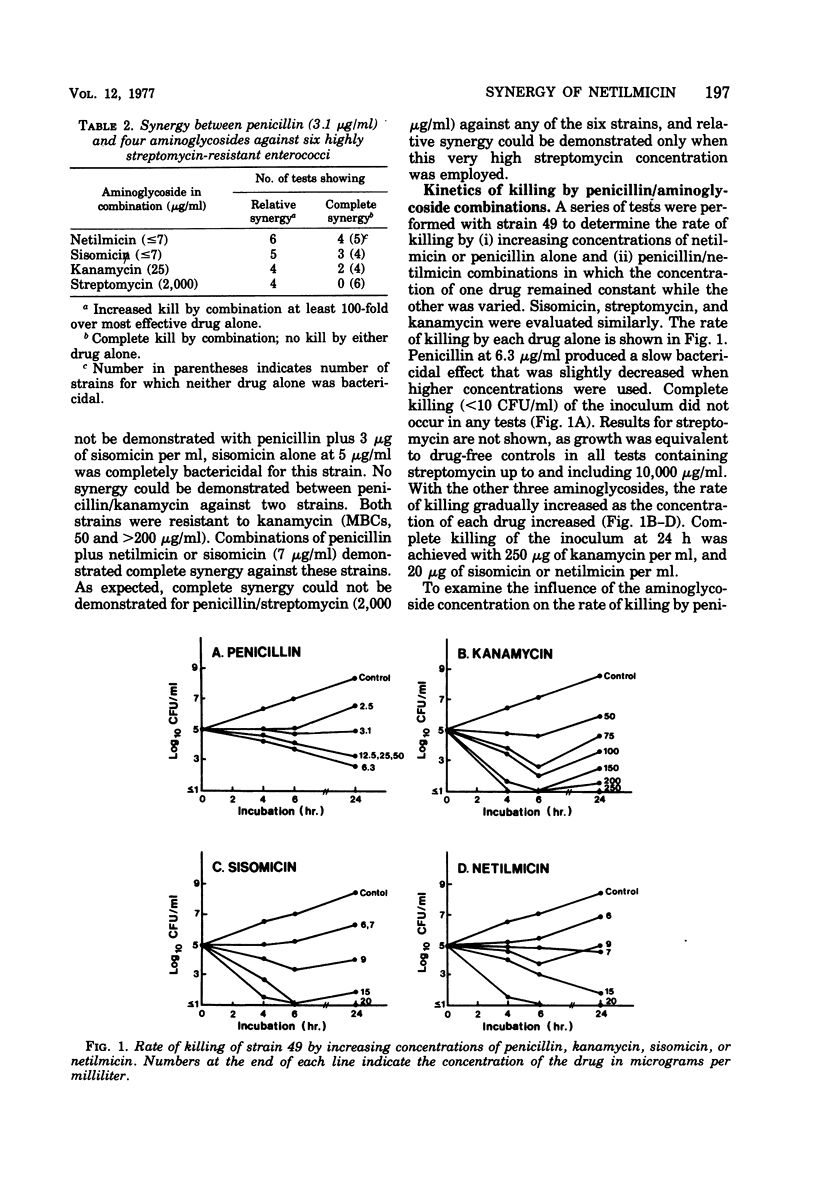
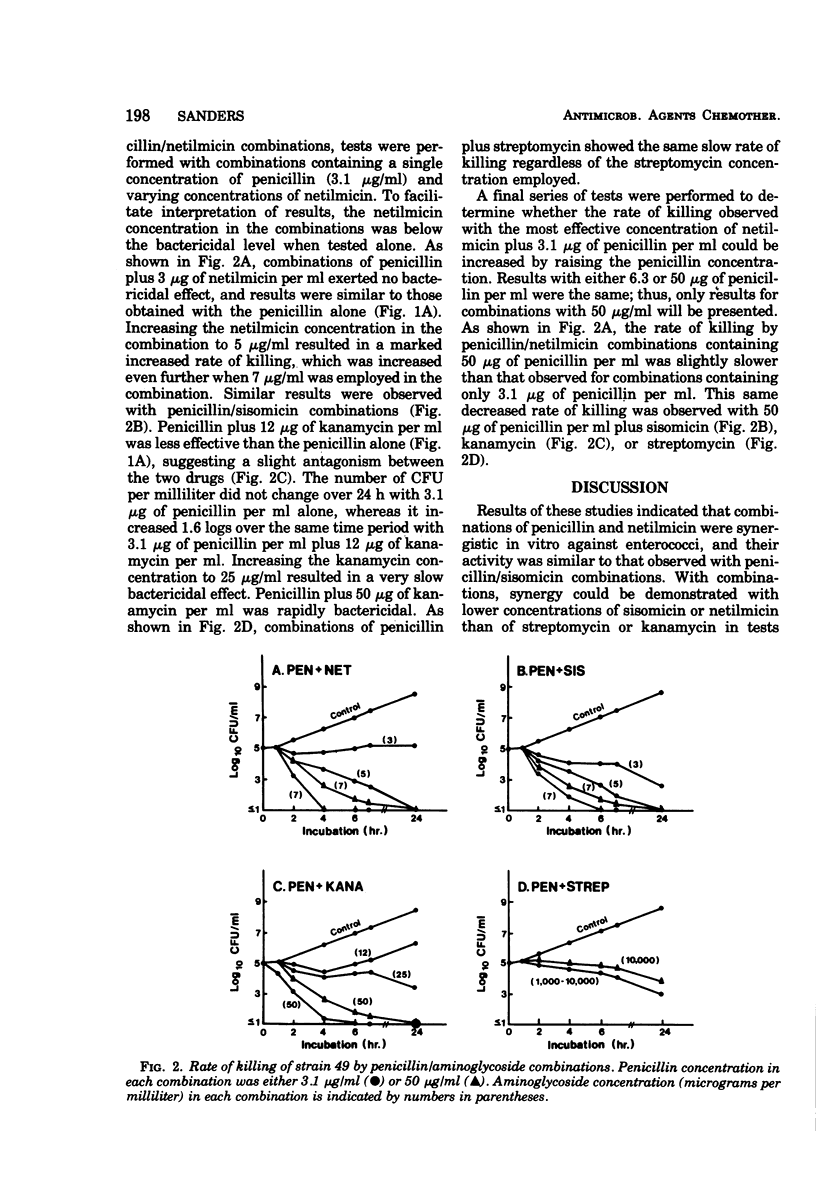
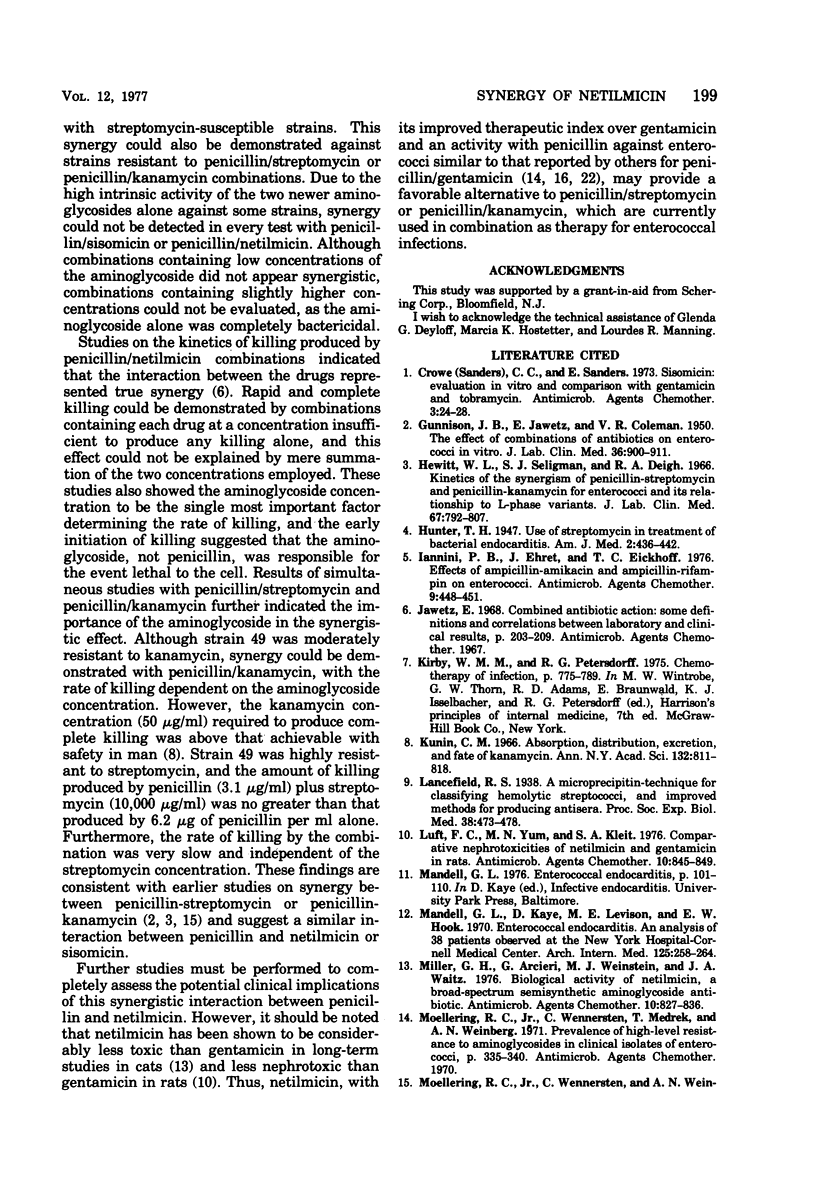
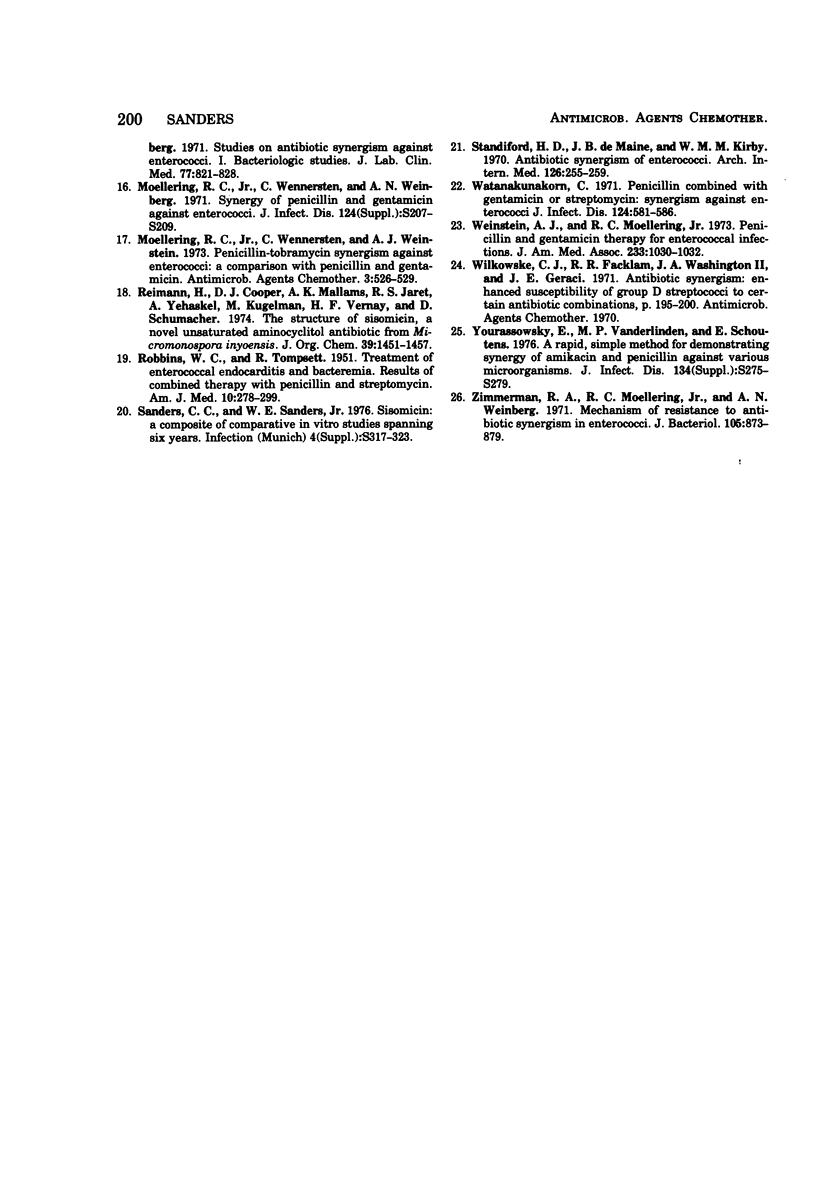
Selected References
These references are in PubMed. This may not be the complete list of references from this article.
- Crowe C. C., Sanders E. Sisomicin: evaluation in vitro and comparison with gentamicin and tobramycin. Antimicrob Agents Chemother. 1973 Jan;3(1):24–28. doi: 10.1128/aac.3.1.24. [DOI] [PMC free article] [PubMed] [Google Scholar]
- GUNNISON J. B., JAWETZ E., COLEMAN V. R. The effect of combinations of antibiotics on enterococci in vitro. J Lab Clin Med. 1950 Dec;36(6):900–911. [PubMed] [Google Scholar]
- Hewitt W. L., Seligman S. J., Deigh R. A. Kinetics of the synergism of penicillin-streptomycin and penicillin-kanamycin for enterococci and its relationship to L-phase variants. J Lab Clin Med. 1966 May;67(5):792–807. [PubMed] [Google Scholar]
- Iannini P. B., Ehret J., Eickhoff T. C. Effects of ampicillin-amikacin and ampicillin-rifampin on enterococci. Antimicrob Agents Chemother. 1976 Mar;9(3):448–451. doi: 10.1128/aac.9.3.448. [DOI] [PMC free article] [PubMed] [Google Scholar]
- Kunin C. M. Absorption, distribution, excretion and fate of kanamycin. Ann N Y Acad Sci. 1966 Jun 14;132(2):811–818. doi: 10.1111/j.1749-6632.1966.tb42999.x. [DOI] [PubMed] [Google Scholar]
- Luft F. C., Yum M. N., Kleit S. A. Comparative nephrotoxicities of netilmicin and gentamicin in rats. Antimicrob Agents Chemother. 1976 Nov;10(5):845–849. doi: 10.1128/aac.10.5.845. [DOI] [PMC free article] [PubMed] [Google Scholar]
- Mandell G. L., Kaye D., Levison M. E., Hook E. W. Enterococcal endocarditis. An analysis of 38 patients observed at the New York Hospital-Cornell Medical Center. Arch Intern Med. 1970 Feb;125(2):258–264. doi: 10.1001/archinte.125.2.258. [DOI] [PubMed] [Google Scholar]
- Miller G. H., Arcieri G., Weinstein M. J., Waitz J. A. Biological activity of netilmicin, a broad-spectrum semisynthetic aminoglycoside antibiotic. Antimicrob Agents Chemother. 1976 Nov;10(5):827–836. doi: 10.1128/aac.10.5.827. [DOI] [PMC free article] [PubMed] [Google Scholar]
- Moellering R. C., Jr, Wennersten C., Weinberg A. N. Synergy of penicillin and gentamicin against Enterococci. J Infect Dis. 1971 Dec;124 (Suppl):S207–S209. doi: 10.1093/infdis/124.supplement_1.s207. [DOI] [PubMed] [Google Scholar]
- Moellering R. C., Jr, Wennersten C., Weinstein A. J. Penicillin-tobramycin synergism against enterococci: a comparison with penicillin and gentamicin. Antimicrob Agents Chemother. 1973 Apr;3(4):526–529. doi: 10.1128/aac.3.4.526. [DOI] [PMC free article] [PubMed] [Google Scholar]
- ROBBINS W. C., TOMPSETT R. Treatment of enterococcal endocarditis and bacteremia; results of combined therapy with penicillin and streptomycin. Am J Med. 1951 Mar;10(3):278–299. doi: 10.1016/0002-9343(51)90273-2. [DOI] [PubMed] [Google Scholar]
- Reimann H., Cooper D. J., Mallams A. K., Jaret R. S., Yehaskel A., Kugelman M., Vernay H. F., Schumacher D. The structure of sisomicin, a novel unsaturated aminocyclitol antibiotic from Micromonospora inyoensis. J Org Chem. 1974 May 31;39(11):1451–1457. doi: 10.1021/jo00924a001. [DOI] [PubMed] [Google Scholar]
- Standiford H. D., De Maine J. B., Kirby W. M. Antibiotic synergism of enterococci. Relation to inhibitory concentrations. Arch Intern Med. 1970 Aug;126(2):255–259. [PubMed] [Google Scholar]
- Watanakunakorn C. Penicillin combined with gentamicin or streptomycin: synergism against enterococci. J Infect Dis. 1971 Dec;124(6):581–586. doi: 10.1093/infdis/124.6.581. [DOI] [PubMed] [Google Scholar]
- Weinstein A. J., Moellering R. C., Jr Penicillin and gentamicin therapy for enterococcal infections. JAMA. 1973 Feb 26;223(9):1030–1032. [PubMed] [Google Scholar]
- Yourassowsky E., Vanderlinden M. P., Schoutens E. A Rapid, simple method for demonstrating synergy of amikacin and penicillin against various microorganisms. J Infect Dis. 1976 Nov;134(Suppl):S275–S279. doi: 10.1093/infdis/135.supplement_2.s275. [DOI] [PubMed] [Google Scholar]
- Zimmermann R. A., Moellering R. C., Jr, Weinberg A. N. Mechanism of resistance to antibiotic synergism in enterococci. J Bacteriol. 1971 Mar;105(3):873–879. doi: 10.1128/jb.105.3.873-879.1971. [DOI] [PMC free article] [PubMed] [Google Scholar]



